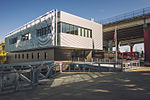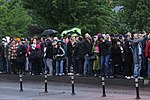Statue of Vera Katz
2006 establishments in Oregon2006 sculpturesBronze sculptures in OregonBuckman, Portland, OregonMonuments and memorials in Portland, Oregon ... and 6 more
Monuments and memorials to womenOutdoor sculptures in Portland, OregonSculptures of women in OregonStatues in Portland, OregonVandalized works of art in OregonWikipedia indefinitely move-protected pages
Vera Katz, also known as Mayor, Vera Katz, is an outdoor bronze sculpture depicting Vera Katz created by American artist Bill Bane. Unveiled in 2006, it is located along the Eastbank Esplanade in Portland, Oregon. Katz, a former mayor of the city between 1993 and 2005, supported arts and culture during her tenure and established Oregon's Percent for Art program. She was also instrumental in developing the Eastbank Esplanade, which is named after her. The sculpture has received a mostly positive reception and has inspired people to adorn it with clothing, flowers and makeup.
Excerpt from the Wikipedia article Statue of Vera Katz (License: CC BY-SA 3.0, Authors).Statue of Vera Katz
Vera Katz Eastbank Esplanade, Portland Buckman
Geographical coordinates (GPS) Address Nearby Places Show on map
Geographical coordinates (GPS)
| Latitude | Longitude |
|---|---|
| N 45.513939 ° | E -122.668202 ° |
Address
Vera Katz Statue
Vera Katz Eastbank Esplanade
97258 Portland, Buckman
Oregon, United States
Open on Google Maps










